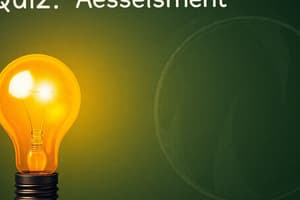Podcast
Questions and Answers
What is a primary purpose of using quizzes in educational settings?
What is a primary purpose of using quizzes in educational settings?
- To reduce teacher workload
- To provide extra credit for students
- To measure student learning and identify areas for improvement (correct)
- To punish students for not studying
Which type of quiz allows students to use reference materials or notes during the quiz?
Which type of quiz allows students to use reference materials or notes during the quiz?
- Short-answer quiz
- Multiple-choice quiz
- True or False quiz
- Open-book quiz (correct)
What is a benefit of using quizzes in educational settings?
What is a benefit of using quizzes in educational settings?
- Reducing student motivation
- Improving retention and understanding (correct)
- Increasing teacher workload
- Decreasing student engagement
What is an important consideration when designing a quiz?
What is an important consideration when designing a quiz?
What type of quiz requires brief written responses to questions?
What type of quiz requires brief written responses to questions?
Why is it important to ensure that quiz questions are relevant to the learning material and objectives?
Why is it important to ensure that quiz questions are relevant to the learning material and objectives?
Flashcards are hidden until you start studying
Study Notes
Definition and Purpose
- A quiz is a form of assessment or evaluation that tests knowledge, understanding, and skills.
- Quizzes are often used in educational settings to measure student learning, identify areas for improvement, and encourage active learning.
Types of Quizzes
- Multiple-choice quiz: Presents a set of questions with multiple answer options, only one of which is correct.
- True or False quiz: Involves questions that require a true or false response.
- Short-answer quiz: Requires brief written responses to questions.
- Open-book quiz: Allows students to use reference materials or notes during the quiz.
Benefits
- Improves retention: Quizzes help students retain information by actively recalling it.
- Enhances understanding: Quizzes encourage students to think critically and make connections between concepts.
- Identifies knowledge gaps: Quizzes help teachers identify areas where students may need additional support or review.
Quiz Design Best Practices
- Clear instructions: Provide clear instructions and expectations for the quiz.
- Relevant questions: Ensure questions are relevant to the learning material and objectives.
- Fair and unbiased: Design quizzes to be fair and unbiased, avoiding cultural or linguistic biases.
- Timed or untimed: Decide whether the quiz should be timed or untimed, depending on the purpose and student needs.
Definition and Purpose of Quizzes
- A quiz is a form of assessment that tests knowledge, understanding, and skills.
- Quizzes are used in educational settings to measure student learning, identify areas for improvement, and encourage active learning.
Types of Quizzes
- Multiple-choice quizzes present questions with multiple answer options, only one of which is correct.
- True or False quizzes involve questions that require a true or false response.
- Short-answer quizzes require brief written responses to questions.
- Open-book quizzes allow students to use reference materials or notes during the quiz.
Benefits of Quizzes
- Quizzes improve retention by actively recalling information.
- Quizzes enhance understanding by encouraging students to think critically and make connections between concepts.
- Quizzes identify knowledge gaps, helping teachers provide additional support or review where needed.
Quiz Design Best Practices
- Clear instructions should be provided for the quiz.
- Questions should be relevant to the learning material and objectives.
- Quizzes should be designed to be fair and unbiased, avoiding cultural or linguistic biases.
- Quizzes can be timed or untimed, depending on the purpose and student needs.
Studying That Suits You
Use AI to generate personalized quizzes and flashcards to suit your learning preferences.




